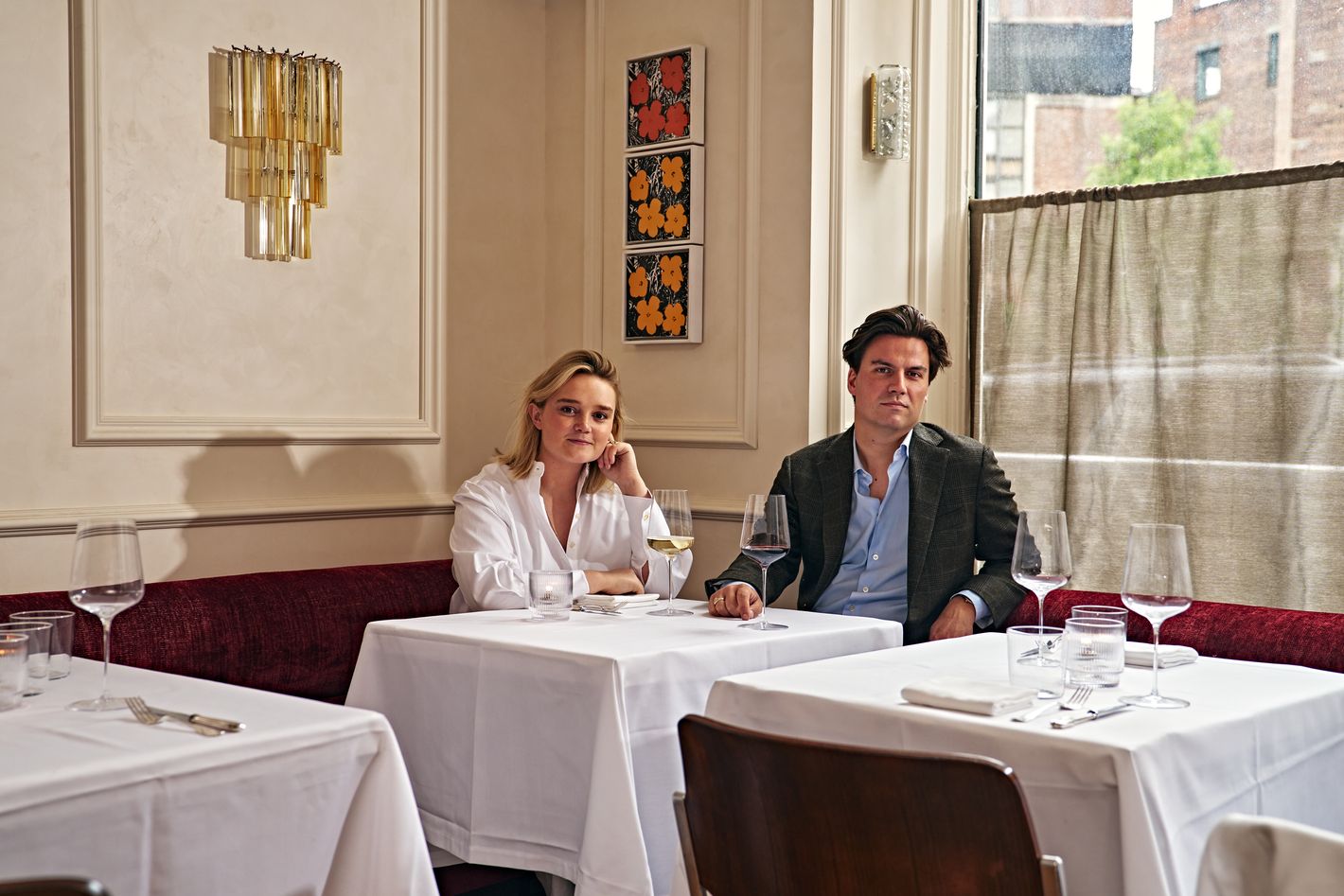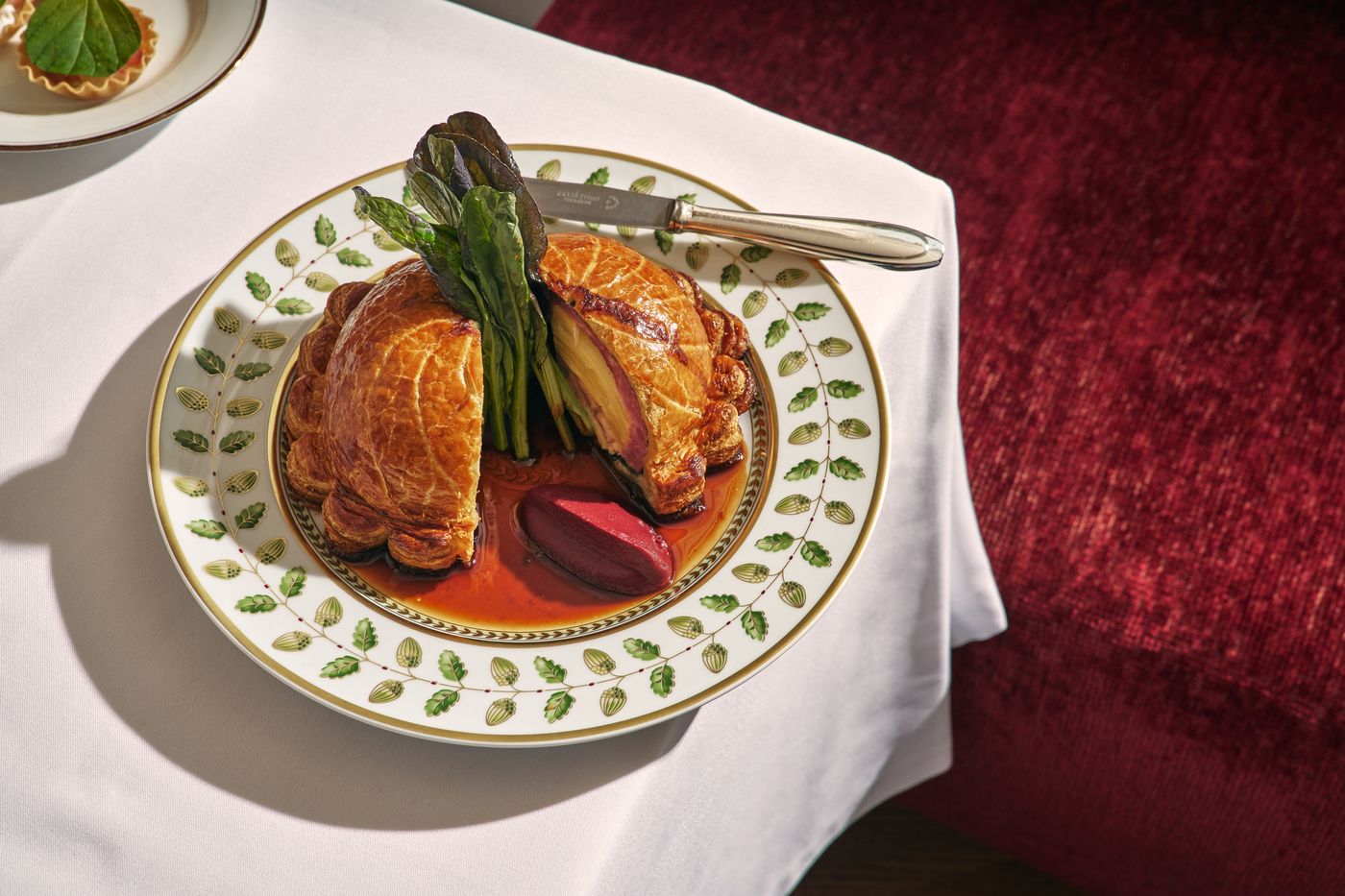when you want, where you want.
CJ Television
A Star From France Is Opening a Properly Luxe Restaurant in the West Village
 Photo: Andrew Bui
Photo: Andrew Bui
Alexia Duchêne’s first restaurant, Le Chêne, is undergoing the last bits of construction before it opens in the West Village this weekend. As of late last week, tools were still buzzing around the horseshoe bar behind the entrance and the kitchen in the back. But the 50-seat dining room was complete, with dark wood chairs, velvety banquettes, white tablecloths, and a gauzy café curtain obscuring the bottom half of the sidewalk-facing windows. Rainbow-colored Basquiat prints are reflected in a mirror on the other side of the room, which, in turn, diminishes the trio of Warhol flowers lined up in a corner. A gilded “Le Chêne” is painted in the chef’s lowercase cursive on the glass pane of the door, with an oak leaf drawn underneath for translation — though Duchêne is prepared for everyone to mispronounce “Le Chêne.” “Literally every single account I open, they’re like, ‘Le Chenay?’” says the chef. “I’m like, Yeah, that’s fine.”
Le Chêne — rhymes with ten — is named after Duchêne and her husband, Ronan Duchêne Le May. They met in France a couple of weeks before the pandemic arrived and decided to isolate together when it did. “In my tiny apartment in Paris, we just spent our time cooking and trying recipes and drinking wine,” says Duchêne. “Ronan likes connecting with everyone. We complete each other because I like to do my thing in the back and I don’t need to go out and see every guest. ”
As such, Duchêne Le May will oversee the front of house, including a 3,000-bottle wine cellar, while Duchêne runs the kitchen, where the initial menu is best described as “fine dining, à la carte.” The menu begins with a changing selection of hors d’oeuvre since, Duchêne says, “snacks are the best part of a ten-course meal.” Green-bean beignets are battered on the outside and steamed and snappy within. Sea urchin tops French toast with bone marrow and red-pepper purée, and raw shrimp tartlets are sweetened slightly with maple and brightened with shiso leaf. They’re all priced by the piece — between $12 and $25 — so that tables can order however many they want, instead of encountering that awkward problem when a dish made of three pieces arrives at a four-top.
This is a French restaurant, so foie gras will appear in the form of the Lucullus, an intricate terrine named for an extravagant Roman general. Le Chêne’s version involves chicken liver, apple, cognac, and port cooked down and layered with beef tongue that is first poached in a star-anise- and coriander-scented broth, served with an agrodolce of sea buckthorn and honey. Equally labor intensive is a pithivier with pork, smoked eel, and potato gratin. Steak — large, dry-aged cuts — will be simpler. “I really love beef,” says Duchêne, “but it should be grilled. Big steak. I don’t really like it with too much sauce or too many condiments. It’s not the perfect vessel for that.”
Dessert — until the full-time pastry chef, Theo Gardet, arrives from Paris — is also under Duchêne’s control. In addition to the chocolate tart with potato ice cream and a goat’s milk ice cream sundae with peas, strawberries, and nuts, there will be rice pudding because it is a favorite of Duchêne’s father. It will be topped with mango caramel, a nod to the fruit her parents would bring it back from trips to Egypt to transform into sorbet at home: “I want to pay a little homage.”
 Andrew Bui
Andrew Bui
The food is slightly different than it was at Duchêne’s only other real New York cooking showcase, helping to open Fort Greene’s Margot in 2023. By that point, she was already a star back home, known as one of the youngest Top Chef France finalists, for her social-media presence, and as the host of a regional cooking show on Canal+. A friend originally connected Duchêne with Margot co-owners Halley Chambers and Kip Green when they were looking for a chef. “I came to New York to do a tasting, then they came to Paris. We had lots of fun,” says Duchêne. She and her husband moved to New York in February that year, and the restaurant opened in May. Duchêne ended up leaving the restaurant after a month and a half. “I think it ended up not working out because we don’t want the same thing out of a restaurant, and I don’t think there is anything wrong with that,” she explains. “We thought that it was better for them to keep their vision of the space because they also did it before I arrived.”
After a few months, Duchêne and Duchêne Le May, who at that time was working as maître d’ at Café Boulud, decided to open a French restaurant of their own. They spent six months developing a business plan, followed by hosting private dinners to court investors and partners. Last December, they got the keys for the space on Carmine Street, which had been Gab’s.
The renovations only took half a year. “We’ve been literally here every day. We moved upstairs.” Duchêne says. The Fawlty Towers lifestyle has helped get contractor issues and deliveries sorted promptly, as it will when something arises once the restaurant is actually running. “It’s something you used to see in the ’70s. A lot of chefs in France, at least, they would live above and have this whole house. You don’t see it anymore because, I mean, apartment crisis and everything, but we were super fortunate that the landlord took over the whole building when we moved in, and he was like, I’ll find you something.”
Everything has come together quickly by the usual standards of a New York restaurant opening. The blue-chip art is on loan from one of the investors, a dealer, while the wine cellar is bulked by the consigned bottles from a different investor. Duchêne Le May plans to make a habit of selecting older and rarer wines to be served by the glass. He also wants to expand the borders of their mostly French cellar, starting with a Vermentino from California by the glass. Another pour, one that might not appear on the list at all, will be a Sauvignon Blanc blend from Chateau Turcaud, Duchêne Le May’s family winery in Bordeaux. “Instead of pouring a little cheap Champagne for people when they arrive,” he says, “we’ll just use this wine because you’re part of the family.”
More New Bars and Restaurants
All Rights Reserved. Copyright , Central Coast Communications, Inc.